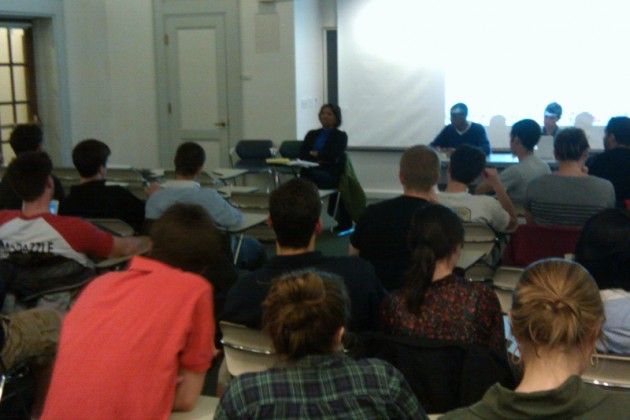Residential Plans are Under Discussion
On Wednesday, April 12, Vice President and Dean of the College Charlotte Johnson held an open forum in the Robert Ho lecture room in Lawrence Hall in which she presented the University’s new plan for residential education, known as “RE2.”
During the presentation portion of the evening, Johnson stressed that the two most important components of RE2 would be the articulation of community standards and expectations and the implementation of a formal assessment and measuring device to ensure that these standards and expectations are met. However, during the question-and-answer session that followed Johnson’s presentation, students, for the most part, concentrated their questions around the changes to Greek Life and interest housing policies that the new residential plan would promote.
The plan includes the first policy recommendations made for Residential Education since the “New Vision for Residential Education” in 2004, which included such familiar recommendations as the First Year Experience and the Wellness Initative.
Major changes to Greek Life include the recommendation for the implementation of one or two more sororities. After a “moratorium” on the discussion of expanding sorority life, the administration is now reacting to the 2008 suspension of Kappa Alpha Theta, which reduced the number of sorority chapters on campus from four to three. This past year, sorority classes reached an average size of 61 women. Under the plan, sorority reform would not be residentially-focused; meaning if new sororities come to campus, they would not be guaranteed to have houses on Broad Street.
Concerns from the audience about the need for a historically multi-cultural sorority were raised during the discussion and Johnson indicated that the level of interest in such an organization would first have to be measured before any decisions were made.
Many attendees were concerned about creating a balance between the Greek and non-Greek Life social scenes.
Johnson made it clear that the administration has been and will continue to be receptive to accommodating student concerns about fostering powerful and viable social options other than Greek Life.
Several student questions surrounded the concern about the ability of other student groups being able to “compete” with Greek Life organizations (GLO’s) who own houses on the so-called “prime real estate” of Broad Street.
“It didn’t even occur to me how non-Greek organizations would be frustrated by the lack of common space to host events, whether they be charitable, alcoholic or just for fun, which is something that the administration really needs to help them out with,” sophomore and forum attendee Courtney Griffin said.
Johnson conceded that there is not a lot of common social space on campus but she also hopes that “people do not view this is a competition between Greeks and non-Greeks.” She also made clear that as part of the contractual agreement between the University and the Greek chapter, as long as Greek organizations are recognized by the school, they would be able to keep their houses.
Representatives from several segments of the student population attended the forum and made their presence known. Among these groups were the Blue Diamond Society (BDS) and the Harlem Renaissance Center (HRC).
Students advocating for the HRC made the point that their interest house was perceived to be a self-segregating space, and they cited the Center’s Bryan Complex location “in the corner of the campus” as inhibiting their group from being a major social player on campus.
The issue of space is something that is not easily solved due to the limited residential space on Broad Street. Johnson cited Cushman House and Unity House as two examples of non-Greek interest housing that has flourished in recent years.
Some attendees were not satisfied with the amount of interest housing available in comparison to the strong Greek presence on campus.
“The biggest issue I see with RE2 is that the ‘proper balance’ that it discusses needs to be based on what students want,” forum attendee and junior Jordan Sheiner said. “This is the only way that Colgate is going to experience natural, genuine housing options that provide the community with beneficial programming and events. If the only debatably successful interest housing has been two of the smallest buildings on Broad Street, while students still are not getting into GLOs who want to join them, then clearly the ‘proper balance’ would come with a growth in the Greek System, and not a continued investment in interest housing. An addition of fraternities would not only help the elitist social scene that is noted as an issue through RE2s analysis of the CCLS, but would also naturally diversify it by spreading out the population and adding space for more students.”
Despite the animosity between Greek and non-Greek organizations that came to the forefront at Wednesday’s open forum, Johnson maintained that she had received “not exclusively, but for the most part, positive feedback” on RE2.
“It’s encouraging to see so many students speak up about the current state of groups on campus,” sophomore and forum attendee Emily Silverman said. “Everyone won’t always agree, but this kind of iscussion is what Colgate needs to stay current and fair.”





